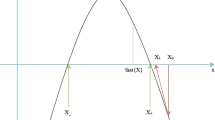Abstract
Matrix equations involving a family of unknown matrices \(X_1, \ldots , X_k\) can be written in a general form \(f(X_1, \ldots , X_k) = 0\). One of the fundamental problems in matrix equation theory is to establish identifying conditions for the matrix equation to always hold for all matrices \(X_1, \ldots , X_k\). In this article, we select some nonlinear matrix equations with two, three, and four unknown matrices as illustrative examples, and show how to establish a family of simple and well-organized necessary and sufficient conditions for these matrix equations to always hold with respect to all unknown matrices in the equations. The methods, results, and facts in this article can be used to efficiently establish various nonlinear identities with variables in different noncommutative algebraic structures.
Similar content being viewed by others
References
Baksalary, J.K., Baksalary, O.M.: An invariance property related to the reverse order law. Linear Algebra Appl. 410, 64–69 (2005)
Baksalary, J.K., Styan, G.P.H.: Around a formula for the rank of a matrix product with some statistical applications. In: R. S. Rees (Ed.), Graphs, Matrices, and Designs: Festschrift in Honor of N.J. Pullman on his Sixtieth Birthday, Marcel Dekker, New York, pp. 1–18 (1993)
Ben-Israel, A., Greville, T.N.E.: Generalized Inverses: Theory and Applications, 2nd edn. Springer, New York (2003)
Campbell, S.L., Meyer, C.D.: Generalized Inverses of Linear Transformations. Dover, New York (1971). Corrected reprint of the 1979 original
Hartwig, R.E., Patrcio, P.: Invariance under outer inverses. Aequat. Math. 92, 375–383 (2018)
Lam, T.-Y.: A First Course in Noncommutative Rings, 2nd edn. Springer, Berlin (2001)
Liu, X., Zhang, M., Yu, Y.: Note on the invariance properties of operator products involving generalized inverses. Abst. Appl. Anal. 1, 1–9 (2014). https://doi.org/10.1155/2014/213458
Marsaglia, G., Styan, G.P.H.: Equalities and inequalities for ranks of matrices. Linear Multilinear Algebra 2, 269–292 (1974)
Penrose, R.: A generalized inverse for matrices. Proc. Camb. Phil. Soc. 51, 406–413 (1955)
Puntanen, S., Styan, G.P.H., Isotalo, J.: Matrix Tricks for Linear Statistical Models: Our Personal Top Twenty. Springer, Berlin (2011)
Rao, C.R., Mitra, S.K.: Generalized Inverse of Matrices and Its Applications. Wiley, New York (1971)
Tian, Y.: Relations between matrix sets generated from linear matrix expressions and their applications. Comput. Math. Appl. 61, 1493–1501 (2011)
Tian, Y.: Extremal ranks of a quadratic matrix expression with applications. Linear Multilinear Algebra 59, 627–644 (2011)
Tian, Y.: Equalities and inequalities for ranks of products of generalized inverses of two matrices and their applications. J. Inequal. Appl. 182, 1–51 (2016)
Tian, Y.: How to establish exact formulas for calculating the max-min ranks of products of two matrices and their generalized inverses. Linear Multilinear Algebra 66, 22–73 (2018)
Tian, Y., Jiang, B.: Closed-form formulas for calculating the max-min ranks of a triple matrix product composed by generalized inverses. Comput. Appl. Math. (2018). https://doi.org/10.1007/s40314-018-0668-5
Werner, H.J.: G-inverse of matrix products. In: Schach, S., Trenkler, G. (eds.) Data Analysis and Statistical Inference, pp. 531–546. Eul. Verlag, Bergisch-Gladbach (1992)
Werner, H.J.: When is \(B^{-}A^{-}\) a generalized inverse of \(AB\)? Linear Algebra Appl. 210, 255–263 (1994)
Xiong, Z., Qin, Y.: Invariance properties of an operator product involving generalized inverses. Electron. J. Linear Algebra 22, 694–703 (2011)
Author information
Authors and Affiliations
Corresponding author
Rights and permissions
About this article
Cite this article
Jiang, B., Tian, Y. Necessary and sufficient conditions for nonlinear matrix identities to always hold. Aequat. Math. 93, 587–600 (2019). https://doi.org/10.1007/s00010-018-0610-3
Received:
Published:
Issue Date:
DOI: https://doi.org/10.1007/s00010-018-0610-3




